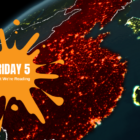News & Analysis
Peru’s Investigative Journalists Carry On Amidst Disinformation, Attacks, and Political Crisis
|
Amidst disinformation and numerous attacks on press freedom, investigative reporting has all but disappeared from Peru’s major news outlets, leaving a handful of small nonprofit digital outlets to carry the mantle of accountability reporting.








